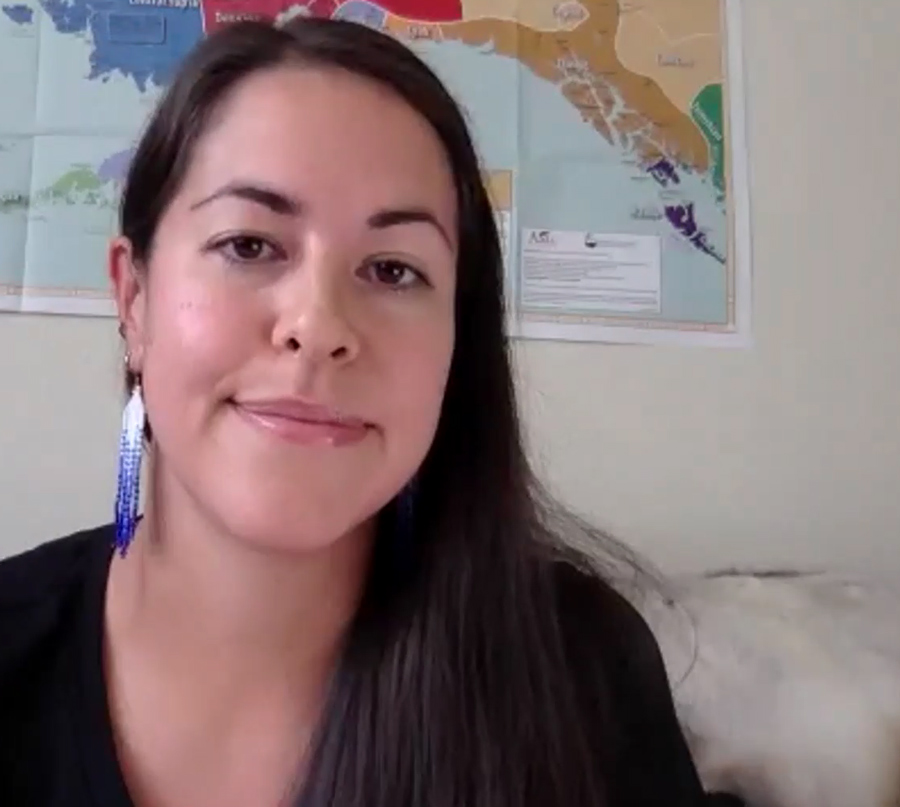the Tlingit Language
in a Pandemic
culture and Lingít Yoo X̲ʼatángi —the Tlingit language
ince the COVID-19 pandemic began, you’ve probably used video conferencing programs a lot more than normal. Perhaps you’ve held a meet-up with friends and relatives, tuned into a community meeting, or jumped around in an exercise class. But have you helped revitalize an Indigenous language?
This summer, 681 people enrolled in a Tlingit language massive open online course (MOOC) conducted via Zoom, a video conferencing platform. MOOCs are common worldwide, offering learners from disparate regions an opportunity to learn together online. The 38-hour, five-week course was offered by Outer Coast College in Sitka, in partnership with Sealaska Heritage Institute. It met online Monday-Friday evenings, offering beginner, intermediate, and advanced conversation and language instruction.
Most nights saw over 100 people attending, some with video cameras on, some choosing to listen only. In Zoom’s characteristic Brady Bunch-style grid format, participants would catch a glimpse into other’s lives through the boxes on the screen: Elders and young babies, families, pet dogs, people outside in the sun and others alone in their rooms. Participants were not just those with Tlingit heritage, but other Alaska Native people from across the state as well as non-Native participants; all were welcome.
X̱ʼunei Lance Twitchell, Ph.D. of Juneau (Tlingit/Haida/Yupʼik/Sami) was the primary instructor and Master of Ceremonies for the course. He also brought in several other instructors and advanced learners from Alaska and Canada to co-teach. X̱ʼunei is an Associate Professor of Alaska Native Languages at the University of Alaska Southeast (UAS), and among many other things, he manages a number of resources at TlingitLanguage.com, writes poetry, and creates Northwest Coast designs and children’s books.
I grew up in Sitka and currently live in Anchorage. My mother’s family is Tlingit, Japanese, and white. I have been studying my Tlingit language—Lingít—since February of this year via Zoom with X̱ʼunei in a small group, and was thrilled to hear that a free online course would be offered this summer to anyone who was interested. I immediately signed up and encouraged family members to join me. I had been able to experience X̱ʼunei’s welcoming and respectful style of language teaching and his wealth of cultural knowledge firsthand. I was pleased when I read the MOOC’s code of conduct for all participants, embodying his teaching style:
- Correct with kindness.
- Speak with love.
- Give everyone a chance to speak; we need to hear everyone’s voices.
- No homophobia. We include everyone. Our language is not binary in our identification.
- Unless someone asks for help, you are not to correct them immediately.
- This is a safe space. Names should not be attributed to individuals out of this space.
- Don’t be afraid. Your mistakes help you and others learn.
“What would happen if [being able to learn Lingít] was wide open?” he wondered.
The result was astounding. For a first-of-its kind effort, the success in the numbers of learners and in the feedback made it clear: there was a hunger for this course, especially in these challenging times. Hosting a Lingít MOOC during the COVID-19 pandemic helped meet the need to speak with and socialize with Elders who might be cut off from loved ones in isolation. It also supported mental health and well-being, providing participants with a sense of belonging, described as a “beacon of hope and joy for me in the middle of this painful time” by one learner, another noting it was a place where “people see they are not alone.” The MOOC gave us something to look forward to each night, familiar faces to find comfort in.
“Tell the English side of your brain to take a nap and come back later,” X̱ʼunei would prompt.

The course continued for a couple weeks after the Outer Coast class, led by the Central Council of the Tlingit and Haida Indian Tribes of Alaska, and longer-term plans to extend online classes are in the works. The goal is that they continue to be free of charge. The Lingít MOOC is yet another example of our people adapting to the times, utilizing the resources at hand, and empowering each other through our culture and Lingít Yoo X̲ʼatángi – the Tlingit language.
My favorite part of class was the end when there would be a flurry of sign-offs and faces popping up on the screen before they logged off: “Gunalchéesh! Gunalchéesh!” (thank you in Lingít). The gratitude and community were as palpable as if we were sitting in a circle holding hands rather than keyboards.
Lingít X̱ʼéináx̱ Sá (a Lingít phrasebook)
Haa Wsineix̱ Haa Yoo X̱ʼatángi (a grammar of Lingít for intermediate learners)
Tlingit Reference Guide (a handbook for using verbs)
Haa Shuka (Lingít Oral Literature)
Haa Tuwunáagu Yís (Lingít Ḵu.éexʼ Speeches)
Tlingit Stem List (a list of Lingít verb stems)
Tlingit Verbs Notes (handwritten notes on Lingít verbs)
Verbal Structure Handbook (a collection of tables to interpret and assemble verbs)